Share

A History of Europe, Key Battles
59.4 Conclusion of the War of Spanish Succession
•
The French army of Louis XIV was on the ropes, but fought hard against the British, Dutch, Austrians and Prussians at the Battle of Malplaquet 1709. Peace was finally agreed in with the Treaties of Utrecht 1713 and Rastadt 1714, establishing a new balance of power on the continent.
Composer - George Friedrich Handel, Water Music
www.historyeurope.net
More episodes
View all episodes
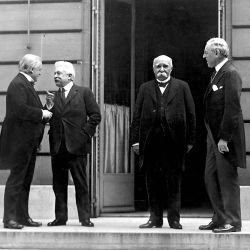
74.19 Treaty of Versailles
20:32The Paris Peace consisted of a group of distinct treaties, but the main concern of the delegates was the settlement with Germany, embodied in the Treaty of Versailles signed in June 1919.Germany’s eastern frontiers presented far greater problems. www.patreon.com/historyeuropewww.historyeurope.netMusic composed by Edward Elgar, Enigma variations, Variation IX (Adagio) NimrodPicture - Treaty of Versailles, Big FourTheme tune for the podcast by Nico Vettese, www.wetalkofdreams.com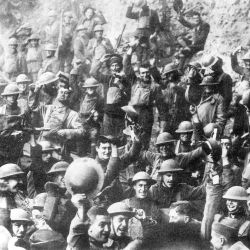
74.18 Endgame, 1918
21:32In Spring 1918 a massive German offensive made significant territorial gains, but ultimately not the intended breakthrough, and the Allied forces stood firm. Exhausted and demoralised at the scale of casualties, the Germans were pushed back in a major counter-attack in the late Summer and Autumn. And on 26 September, the Allies launched a general offensive along the entire Western Front.Meanwhile, the Habsburg empire was fast falling apart as various nationalities declared independence. www.patreon.com/historyeuropewww.historyeurope.netMusic composed by Alexander Scriabin, Etude in C sharp minor. Courtesy of musopen.orgPicture - US 64th regiment celebrate the ArmisticeTheme tune for the podcast by Nico Vettese, www.wetalkofdreams.com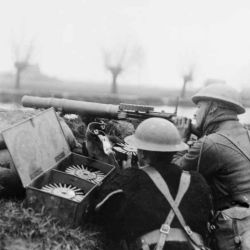
74.17 The Final Gamble, 1918
20:40After the Russian withdrawal from the frontlines following the October revolution, the treaty of Brest-Litovsk is negotiated between Germany and Russia.The Germans sought to conclude war on the Eastern Front as quickly as possible, while at the same time trying to establish an informal empire in east-central Europe, one composed of newly independent nation states on Russia’s western periphery. However, back on the German home front, after four harsh winters and widespread hunger, political unity was fraying, and riots and strikes occurred across the country. Everything now depended on the success or failure of a German Spring Offensive on the western front. www.patreon.com/historyeuropewww.historyeurope.netPicture - German Spring Offensive - British Lewis gun team at the Battle of Hazebrouck 1918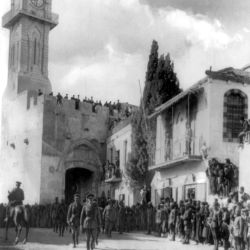
74.16 War of Attrition on the Western Front 1917
24:00While the nations of Europe fought each other to a bitter stalemate, the President of the United States, Woodrow Wilson, urged both sides to make peace. However, no agreement is made and the United States joined the war on the side of the Entente allies.In the meantime, the Germans ordered a general withdrawal at the western front, abandoning the battlefields of the Somme in order to establish a shorter, straighter and more well-fortified line, the so-called ‘Hindenburg Line’. The eastern front is more volatile, seeing the collapse of the Russian army, a major defeat for the Italians at Caporetto and the fall of Jerusalem to the Britishwww.patreon.com/historyeuropewww.historyeurope.netMusic composed by Vaughan Williams (Fantasia on a Theme by Thomas Tallis), courtesy of musopen.orgPicture - Allenby enters Jerusalem 1917Theme tune for the podcast by Nico Vettese, www.wetalkofdreams.com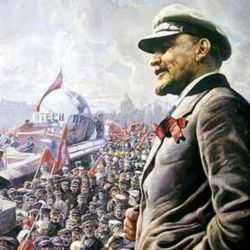
74.15 The Russian Revolution 1917
21:55As the year 1917 dawned, Europe had been at war for two and a half years, and pressures on the home fronts were becoming intolerable. Every participant nation came under huge strain.In Russia the Tsarist regime falls in March, but the interim government is unstable and itself falls in the famous October Revolution, led by Vladimir Lenin, who promises to withdraw Russia from the war.www.patreon.com/historyeuropewww.historyeurope.netMusic composed by Frederich Chopin (The Polish Dancer)Picture - Vladimir Lenin, 1 May 1920 by Isaak_BrodskyTheme tune for the podcast by Nico Vettese, www.wetalkofdreams.com
74.14 Battles of Verdun and The Somme 1916
26:39Europe entered the year 1916 exhausted by one and a half years of conflict of a scale hitherto unimaginable, with profound effects on citizens at home, as well as those on the front line.The most intensive battles on the western front in 1916 are at Verdun and the Somme, with extraordinary numbers of casualties.Meanwhile, on the eastern front the Russians launch a major attack, the Brusilov offensive.Romania declared war on Austro-Hungary on 27 August 1916 and promptly invaded Transylvannia. www.patreon.com/historyeuropewww.historyeurope.netMusic composed by Erik Satie (Gymnopédie no. 1), Nikolai Rimsky-Korsakov (Russian Easter Festival Overture, Op. 36)Picture - Verdun - Gervais-Courtellemont_french_anti-aircraft_gunsTheme tune for the podcast by Nico Vettese, www.wetalkofdreams.com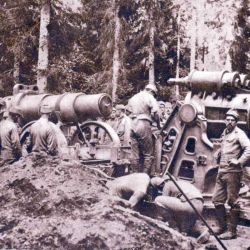
74.13 Eastern and Western Fronts 1915
21:49For the Germans, 1915 was a year that should not have been. Their whole strategy had been based on a quick war, but they now found themselves embroiled in a two-front war – on the eastern front against Russia, and on the western front against France fully mobilised and also Britain.Throughout 1915, in a succession of attacks of increasing intensity, the various armies learned the techniques of the new kind of war at very heavy cost.In February 1915, Germany launched the Second Battle of the Masurian Lakes with an attack on the Russians in East Prussia. Meanwhile, the Austrians attempted to push deep back into Galicia, with huge numbers of casualties on all sides.www.patreon.com/historyeuropewww.historyeurope.netMusic composed by Frederich Chopin, Mazurka in C sharp minor, Op. 6 no. 2Picture - Skoda_305_mm_Model_1911_LOC_War_of_the_NationsTheme tune for the podcast by Nico Vettese, www.wetalkofdreams.com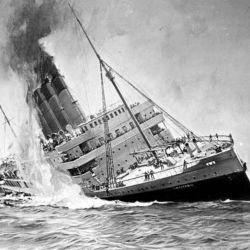
74.12 Turkey and Italy Enter the War, 1915
20:06The first months of fighting in the First World War had seen no major breakthrough from any side. The Germans had captured about ten percent of France, and reached within sixty miles of Paris, but then reached a stalemate as both sides fortified their positions with great long lines of trenches running from Belgium to the Swiss border.Both sides attempt to bring other countries into the war to help break the stalemate and to tip the balance in their favour. The Italians, though deeply divided, decide in the end to join the side of Britain, France and Russia. And an allied attack against the Ottomans fails at Gallipoli.www.patreon.com/historyeuropewww.historyeurope.netMusic composed by Freredich Chopin, Mazurka in C Sharp MinorPicture - Sinking of the LusitaniaTheme tune for the podcast by Nico Vettese, www.wetalkofdreams.com
74.11 The Eastern Front 1914
25:50The Russians strike hard against their most powerful enemy, Germany. Austro-Hungary help their German ally although their military forces are under-resourced, in large part because through the years the Hungarian parliament had restricted military finding by using it as a bargaining chip for political concessions.While the Austrians attack Serbia, the Germans achieve a significant victory against Russia at the Battle of Tannenberg.www.patreon.com/historyeuropewww.historyeurope.netMusic composed by Alexander Scriabin - Etude in C Sharp MinorPicture - Tannenberg Bundesarchiv, East Prussian German InfantryTheme tune for the podcast by Nico Vettese, www.wetalkofdreams.com